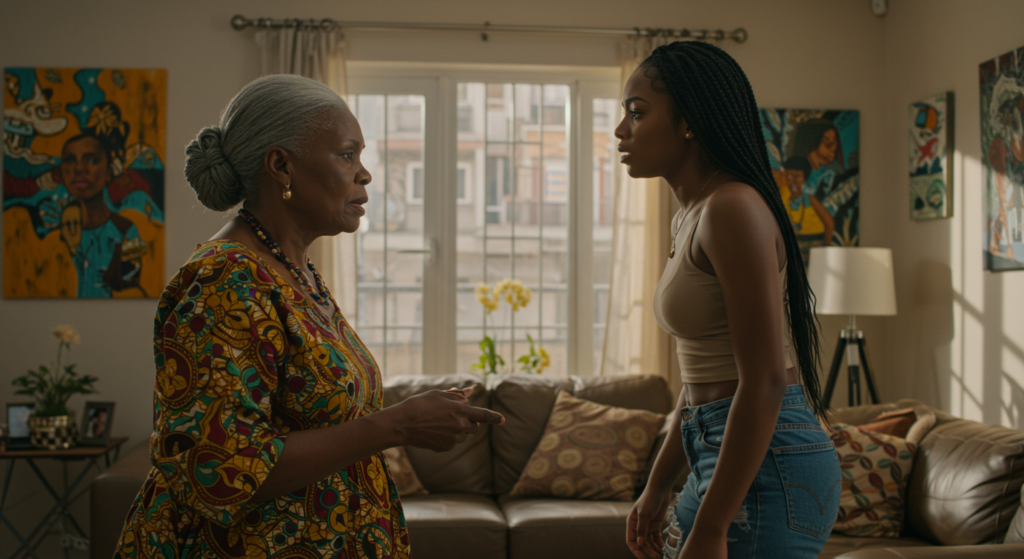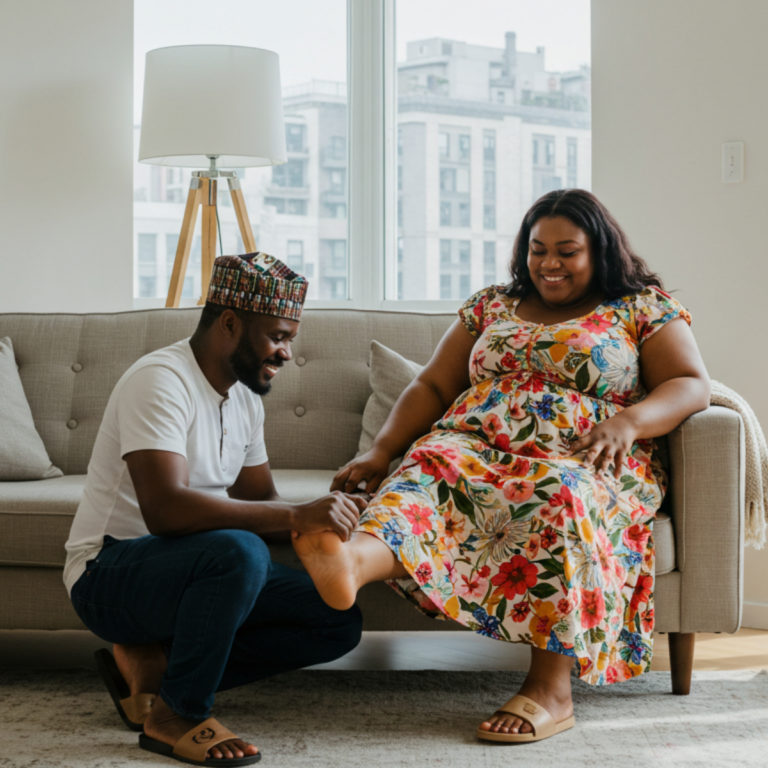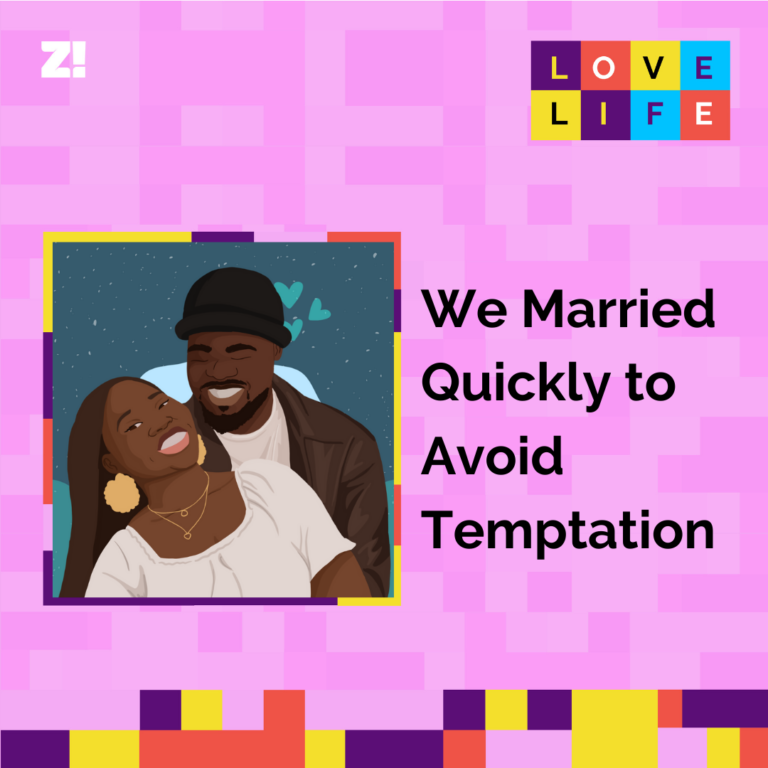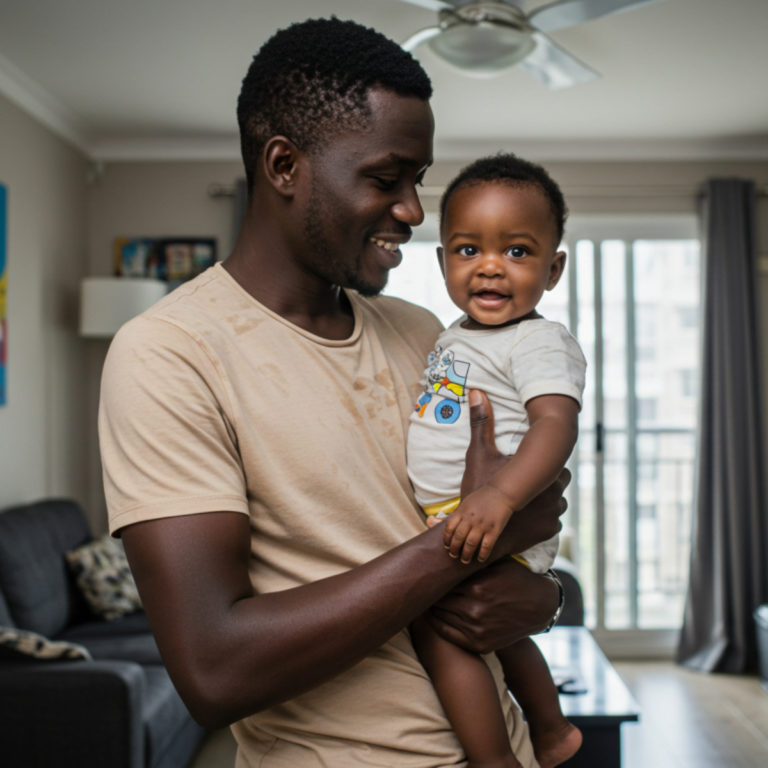Growing up in a Nigerian household, respect for your parents is non-negotiable. You don’t raise your voice at them — much less your hand. But what happens when years of tension, misunderstandings, and frustration finally boil over?
For *Tola (30) and her mum, *Rasheedat (56), one moment changed their relationship forever. Fifteen years ago, in the heat of an argument, Tola did the unthinkable — she hit her mother back. What followed was a silence neither of them knew how to break, and years of a fractured relationship.
In this story, the mother and daughter open up about that day, the years of resentment that led to it, and how they’ve spent the last decade and a half trying to find their way back to each other.

As told to Adeyinka
Tola: I was 15 when it happened. I don’t even remember what the fight was about, just that it felt like the thousandth time we were having the same argument. My mother always had an opinion on how I should dress, how I should talk, how I should exist. She wanted perfection, and I was tired.
It started in the kitchen. She was scolding me — again. I was washing plates, and she stood over me, criticising the way I held the sponge, the way I rinsed the plates, how I wasn’t doing it properly. It wasn’t really about the plates, though. It never was. It was about her general dissatisfaction with everything about me.
“You don’t listen,” she said. “That’s your problem. That’s why I have to say things ten times before you hear me.”
I was already in a bad mood that day. School was exhausting, my friends were drifting away, and I felt like I was suffocating under her rules. I don’t even know when I snapped. I turned to her and shouted, “Mummy, leave me alone!”
Then she slapped me.
Rasheedat: I didn’t think before I slapped her. It wasn’t planned. It was just instinct — what my own mother would have done if I had spoken to her that way. But what happened next shocked me.
She slapped me back.
For a second, I didn’t understand what had happened. My own child, raising her hand to me? It felt like the world tilted. I could still feel the sting on my face, but it was nothing compared to the shock. I saw it in her eyes, too. The way her anger melted into horror. She hadn’t planned to do it. But it happened, and she couldn’t take it back.
Tola: The moment my palm landed on her face, I wanted to disappear. I had never seen my mother look at me like that before; like I was a stranger, like she didn’t know who I was. I took a step back, but my heart was racing too fast to process what I had done. She didn’t say a word. She just turned and left the kitchen.
I stood there, waiting for her to come back and punish me, to scream, to call my father, to tell my uncles or aunties. But she never did, and that was the worst part.
Rasheedat: I kept it a secret. Not because I wasn’t angry, but because I didn’t know what to do with the anger. What was I supposed to say? That my daughter, my own flesh and blood, had hit me? How would I explain that to my husband without it becoming something bigger than it already was?
I was hurt, but I was also ashamed. I told myself I had failed as a mother. That I had raised a child who had no respect. But at the same time, a small voice in my head asked: How did we get here?
Tola: That day changed everything. My mother didn’t speak to me for days. Not in the way she usually did, where she would sulk and then get over it. This was different. The silence sat between us like a wall. I think that was when I realised I had truly hurt her. It wasn’t just about the slap. It was everything leading up to that moment. The years of resentment I had built up, the way I felt like I could never please her, the way she never seemed satisfied with anything I did.
I wanted to apologise, but I didn’t know how. So I just pretended like it never happened.
Rasheedat: We both pretended. I went back to being her mother, managing the house, making sure she ate, waking her up for school, but something between us had shifted. The mother-daughter trust and closeness, which was barely there before, completely dried up. I spent the following weeks and months questioning myself. Had I been too harsh? Had I expected too much from her? But that was the way with girls, one could never be too laid back. My mum was tougher, and she constantly berated me for being too soft on Tola.
Yet, I would overhear her friends ask why her mother was so “strict,” why she couldn’t do normal teenage things, and it stung. I wasn’t trying to punish her. I was trying to prepare her for life. But I also knew that if I had hit my own mother at her age, I wouldn’t have lived to tell the story.
Her dad soon noticed the distance between us. He would ask why Tola barely stayed around when I walked in or why she only gave short, formal answers when we talked, and I’d tell him she was just being a teenager. What was I supposed to say? That my daughter hit me or that I kept the secret from him and had never fully forgiven her?
READ THIS TOO: My Mother Abandoned Me for a Cult and Never Looked Back
Tola: My brothers never brought it up, either. We had always been close in that sibling way — insulting each other for fun, ganging up on our parents when they annoyed us. But none of them ever sat me down to ask why I was suddenly distant with our mum. Maybe they noticed, maybe they didn’t. Or maybe, as boys, they just assumed it wasn’t their business.
I don’t think we ever fully recovered from it. Even after I left home for university, the distance between us wasn’t just physical, it was emotional too. I stopped telling her about my life, and she stopped asking. When I had my first real heartbreak, I didn’t think to call her. When I struggled with school, I reached out to my dad instead. But the thing about time is that it forces you to see things differently. As I got older, I started to realise my mother wasn’t just my mother, she was a person too. A woman with her own history, fears, and wounds. I began to wonder: Was she really too strict, or was she just doing the best she could with what she knew?
Still, I didn’t know how to fix things. Then one day, eight years after the event, I called her. The call happened when I was in my final year of university. I don’t even remember what prompted it. Maybe it was stress, maybe I just missed her. But for the first time in years, I dialed her number without overthinking it.
She sounded surprised to hear my voice, but not cold. We talked for hours — about everything and nothing. She asked about school, I asked about home. We didn’t bring up that day, but it lingered between us. It was the first time I felt like I had my mother back.
Rasheedat: That call was unexpected, but it was also what I had been waiting for. I missed my daughter, but I didn’t know how to reach her. I knew she had built walls around herself, and maybe I had, too. When we spoke, it felt like a door had opened, but I also knew one conversation wouldn’t erase years of distance.
Tola: After that, we tried. But trying didn’t mean everything suddenly became perfect. When I finished uni, I chose not to serve in Lagos. I told everyone I wanted to experience a new environment, but the truth was, I wasn’t ready to move back home. Things with my mum were getting better, but they weren’t quite where they should be. Even after NYSC, I found a job in another state. I visited home occasionally, but I kept my distance. I didn’t want to risk falling back into old patterns.
Rasheedat: I noticed she kept finding ways to stay away, but I didn’t fight it. Maybe she still needed time. Maybe I did, too.
Tola: Then my mum got sick in 2020 during the COVID pandemic. It started with headaches, then dizziness, then a day where she couldn’t remember things clearly. I got the call from my aunt, and for the first time in years, I felt actual fear. I took a leave from work and came home immediately. Seeing her weak, confused, needing help, broke something in me.
Rasheedat: The sickness started with small things like forgetting where I kept my phone, losing track of conversations. Then one day, I woke up and couldn’t remember what month it was. My sister panicked and called Tola. I didn’t even know she was coming home until I saw her standing in my room. When she arrived, I wanted to cry. My daughter had been slipping away from me for years, but in that moment, I saw that she still cared.
Tola: I didn’t leave her side for days. We didn’t talk about anything deeply personal, but I could feel something shifting. I was scared that I had spent so many years pushing her away, scared that I would lose her before we truly made things right. That was the moment I knew I had to let go. Of the resentment, the disappointment, the hurt.
Rasheedat: When I got better, I noticed a difference. She didn’t pull away anymore. She called more often, visited when she could. I knew we would never go back to the mother-daughter relationship I once imagined, but maybe this new version was enough.
Tola: I still don’t know if we’ll ever really talk about what happened that day. Maybe we don’t need to. What I do know is that life is too short to hold on to pain. My mother isn’t perfect, but she’s here. And after everything, I’ve decided that’s what matters.
ALSO READ: My Mum Believed in Public Shaming, But I’m Raising My Kids Differently




